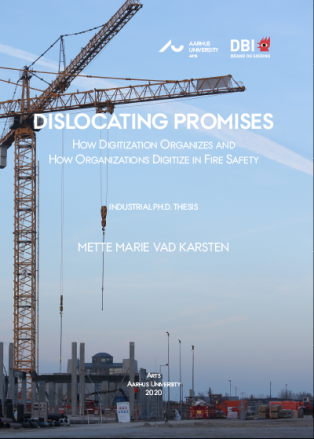DISLOCATING PROMISES: How Digitization Organizes and How Organizations Digitize in Fire Safety
Synopsis
The aim of this thesis is to produce new anthropological knowledge on the digitization of complex knowledge areas – in this case fire safety in the Danish architecture, engineering, and construction (AEC) industry. As the thesis reflects an industrial Ph.D.-process, the aims and success criteria have been both academic as well as commercial and overlap in this thesis. With a vantage point in organizational anthropology, the project has taken great interest in investigating how digitization may be conceptualized as a social, professional and organizational practice, and how digitization and organization of knowledge and expertise crisscross, merge and mutually affect each other. Based on these anthropological interests, the thesis further investigates how the digitization of knowledge and expertise in complex areas such as fire safety is carried out, and how risk assessments may be digitized in a way so that the users of the digital tools have confidence in both fire safety professionals and the digital tools.
The majority of anthropological research on digitization in or across organizations focuses on how users of the digital tools appropriate, shape and use these tools. In short, these analyses most often focus on everyday use, on implementation, and the impact of such implementation for the end-users of these tools. Conversely, there is little anthropological research on the preceding development of these tools, let alone about how professionals yield a piece of their knowledge and expertise to a digital program, which they themselves help develop. There are some studies of given groups of professionals who develop digital tools, but rarely of the encompassing organization that orchestrate the digitization process. This dissertation unfolds here – in the nexus between digitization and organization – and seeks to illuminate how digitization organize expertise, and how organizations organize such expertise and shape digitization accordingly. Thus, the thesis delves into what constitutes professional expertise in complex, knowledge-intensive, powerful and politically shaped professional fields like fire safety. Fire safety expertise is juxtaposed with the agendas of digitization, and this produces a nexus between digitizing and organizing which points towards various challenges and concerns. I suggest that these issues form the basis for why digitization in the architecture, engineering and construction is experienced as slack, difficult and problematic.
This thesis not only presents an anthropological analysis of digitization in an organizational context, but it is also a testimony to the professional learning process that junior anthropologists and researchers undergo. The issues presented in this thesis are discussed against a backdrop of methodological and ethical circumstances and conditions prevailing during fieldwork. As an industrial PhD-fellow, I was employed by Danish Institute of Fire and Security Technology (DBI) to study internal relations and settings in the organization as well as external relations with clients. In the process, it transpired that my access and participation in the processes and projects I was employed to understand was predetermined by a collaborative engagement as a colleague rather than a researcher. Thus, the methodological and ethical circumstances of the fieldwork constitute a substantial part of this thesis.
The thesis ends with six concrete recommendations directed to DBI, as well as other organizations facing digitization of expertise and knowledge among their employees. The recommendations include suggestions for how transdisciplinary collaborations during digitization can be built; suggestions for how organizations can initiate internal discussions about which kind of digitization process they want to help avoid challenges later on; and an invitation to top management to hold self-critical conversations and discussions about the intentions behind digitization and who it benefits.

